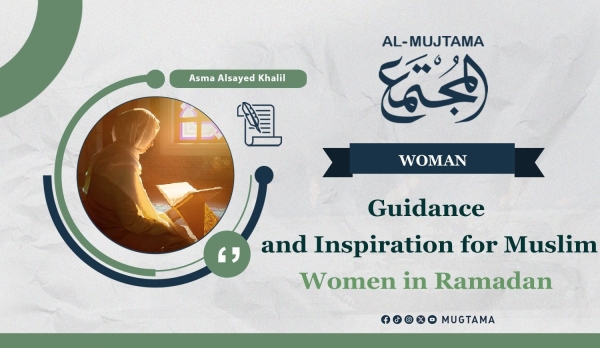Ramadan is a sacred month, in which Allah has honored the Ummah of Muhammad above all other nations. It is a divine blessing, as Allah revealed His Book in it and made its fasting the noblest of fasts and its night prayers the most meritorious. It is a month of mercy, compassion, repentance, forgiveness, and liberation from the Hellfire.
Scholars have advised making use of the days and nights of this month for self-improvement and spiritual elevation, which in turn leads to influencing others positively. In this way, Ramadan becomes an educational framework offering numerous opportunities for goodness, benefiting individuals, families, and society as a whole.
Month of Fasting, Prayer, Quran, and Spiritual Nourishment
Here are some important recommendations for Muslim women during Ramadan:
First: Muslim Women’s Faith
- Muslim Women should see Ramadan as an opportunity to renew their faith in Allah, remember the Hereafter, and observe His commands and prohibitions without excessiveness or neglect. Their intention should always be sincere, seeking the reward from Allah.
- They must observe the etiquettes of fasting—avoiding indecent speech, gossip, and slander—and strive against their soul in this regard. They should also increase in supplications, as Ramadan is a month of answered prayers, and be consistent in remembering Allah in all circumstances.
- They should pray as soon as they hear the call to prayer, give special attention to the Fajr prayer, and not deprive themselves of the night prayers and Tahajjud.
- They should develop a deep connection with the Quran in this month more than any other, as it is the month of the Quran, revealed as guidance and healing for the believers: “The month of Ramadan [is that] in which the Quran was revealed, a guidance for the people and clear proofs of guidance and criterion.” (Al-Baqarah: 185)
- They should give charity, even if only a little, as there are many ways to give in this era. They should not withhold charity, lest Allah withhold provision from them, but rather seek abundance and blessings through generosity: “Never will you attain the good [reward] until you spend [in the way of Allah] from that which you love. And whatever you spend – indeed, Allah is Knowing of it.” (Aal Imran: 92)
- They should enrich their mind and educate herself on matters of faith, to be able to perform acts of worship correctly and with understanding.
Second: Muslim Women’s Home
- They should support their husbands in fasting and night prayers, remind them if they forget, enjoin good and forbid evil, and use the spirituality of Ramadan as an opportunity to purify the home atmosphere and eliminate any negativity or conflicts.
- They should encourage their children to fast, pray, read the Quran, and attend congregational prayers. If possible, they can organize a family learning session where they study the Quran, Sunnah, or the Prophet’s Seerah together.
- They should be role models for their children in all aspects, guiding them with sincerity and motivating them to compete in good deeds.
- Just as they prepared well for Ramadan and worked diligently during it, they should also organize a farewell gathering with their husbands and children to leave a lasting impression of the month’s spirituality and joy in their hearts, imprinting a love for faith and righteousness throughout the year.
Third: Muslim Women’s Relatives and Neighbors
- A Muslim women should uphold ties of kinship, especially in Ramadan, with their parents being the top priority, as numerous hadiths highlight its virtues: “He who wishes to have his earnings grow (and be blessed) and his term of life prolonged, he should keep ties with his kin.” (Al-Bukhari) This can be done through checking on them, visiting them, inviting them for iftar or suhoor, giving charity to those in need, and praying for them.
- They should also care for their neighbors, as the Prophet ﷺ said: “The companion who is the best to Allah is the one who is best to his companion. And the neighbor that is the best to Allah is the one that is best to his neighbor.” (At-Tirmidhi) It is recommended to greet them with Ramadan blessings, share food with them, and use the month as an opportunity for reconciliation and forgiveness if needed.
Fourth: Muslim Women’s Society and Ummah
- A Muslim women, like men, is responsible for calling to Allah at all times. In Ramadan, people’s hearts are more receptive to goodness, so she should spread the message of Islam in any way she can—sharing its guidance, justice, compassion, and unity—contributing to the establishment of a virtuous Muslim society.
- They should work towards relieving the distress of the needy and fulfilling the rights of the poor, sick, and oppressed. Numerous charitable organizations and relief funds make it easier to do so, but they can also establish their own initiatives, alone or with others, to reach those in need.
- They should allocate part of their wealth to support the underprivileged, rather than indulging in excessive spending during Ramadan, turning the month of piety into one of extravagance. If the Muslim Ummah adheres to the Prophet’s guidance: “One person’s food is enough for two, two persons’ food is enough for four.” (Muslim) then no one would be left hungry or in need.
- They should remain concerned about the affairs of the Muslim Ummah, stay informed about its issues, and support its causes to the best of her ability, especially the Palestinian cause. They should boycott the products of oppressors, expose their schemes to seize Muslim lands and corrupt Islamic values, and engage in any initiative that benefits oppressed Muslim communities—offering them both material and moral support, as they are as deserving of prayers as assistance.
-------------------------------------------------------------


